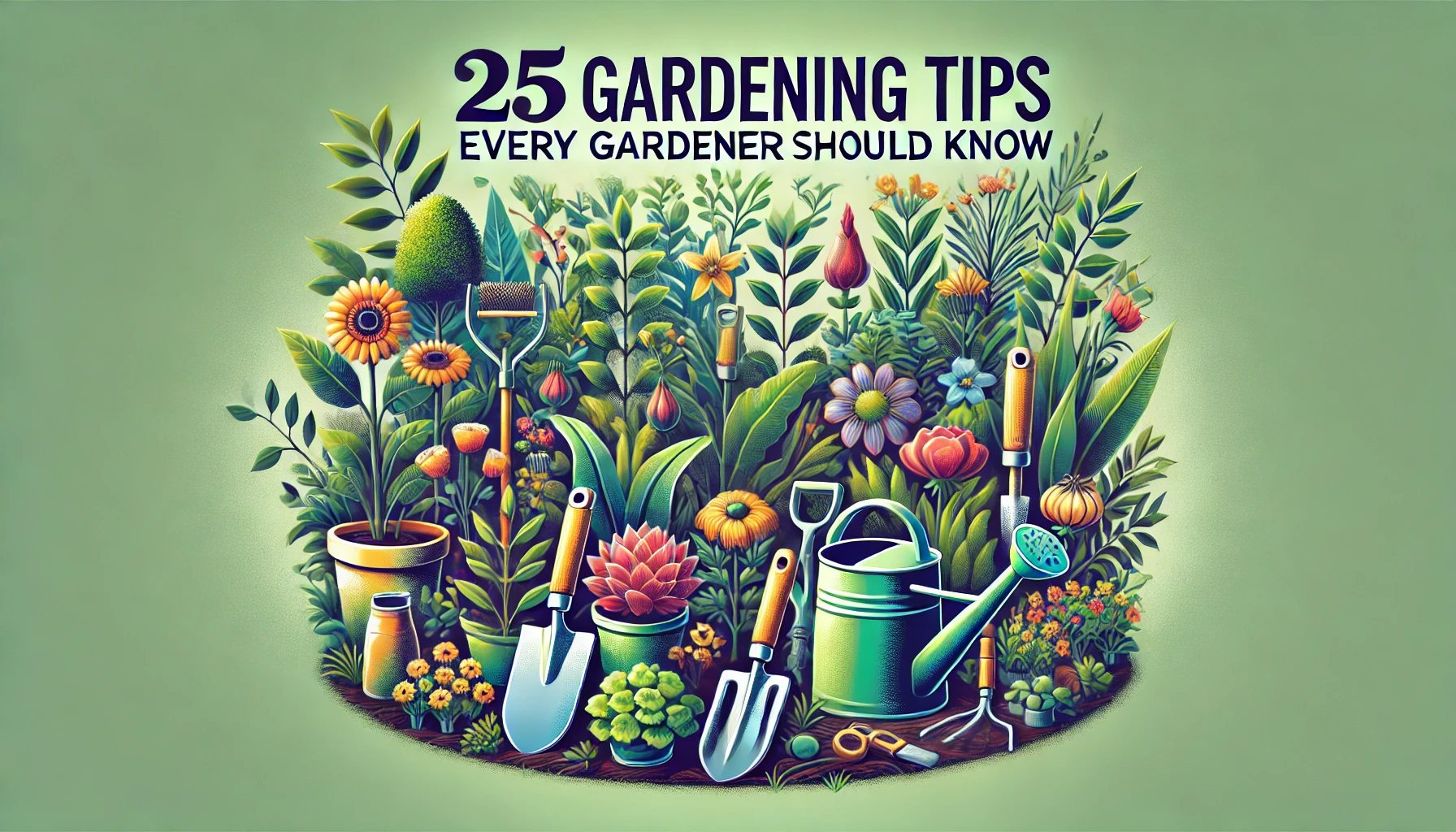Gardening is both a relaxing and rewarding activity, whether you’re a beginner or an experienced gardener. To help you get the most out of your garden, we’ve compiled a list of 25 essential tips that every gardener should know. From planting to maintaining your garden, these tips will guide you through each step.
1. Start with Healthy Soil
Healthy plants begin with healthy soil. Test your soil to ensure it has the right pH balance and nutrients. Adding compost or organic matter can improve soil quality.
2. Choose the Right Plants for Your Climate
Always select plants that thrive in your local climate. Check the hardiness zone of your area and choose varieties that will grow well in your region’s specific conditions.
3. Water Early in the Morning
Watering in the early morning ensures that your plants absorb water before the heat of the day evaporates it. This keeps the soil moist and reduces the risk of diseases.
4. Use Mulch to Retain Moisture
Applying a layer of mulch around your plants helps to conserve moisture, suppress weeds, and keep the soil cool.
5. Prune Regularly
Regular pruning promotes healthy growth and helps prevent plants from becoming overgrown. Trim away dead or diseased branches to encourage new growth.
6. Rotate Your Crops
To avoid depleting soil nutrients and reduce the risk of pests, rotate your crops every season. This is especially important for vegetable gardens.
7. Use Companion Planting
Certain plants grow better together. For example, planting basil next to tomatoes helps repel insects, while marigolds can deter pests from other crops.
8. Water Deeply and Less Frequently
Instead of frequent shallow watering, give your plants a deep soak. This encourages deep root growth and helps your plants become more drought-resistant.
9. Harvest Rainwater
Install a rain barrel to collect water from your gutters. Using rainwater to irrigate your garden is eco-friendly and can help lower your water bill.
10. Know When to Fertilize
Plants need different nutrients at different stages of growth. Use a balanced fertilizer during the growing season, and switch to a phosphorus-rich fertilizer when plants are flowering.
11. Keep Your Tools Clean
Dirty tools can spread diseases from one plant to another. Clean your tools after each use to prevent contamination.
12. Plan Your Garden Layout
Consider the space, sunlight, and water needs of your plants when planning your garden layout. Group plants with similar requirements together to make care easier.
13. Control Weeds Early
Weeds compete with your plants for nutrients and water. Remove them while they’re still small, and use mulch or landscape fabric to keep them at bay.
14. Use Raised Beds
If your soil quality is poor or you’re dealing with limited space, raised beds are a great option. They provide better drainage and make it easier to manage the garden.
15. Deadhead Flowers
Remove spent blooms from flowering plants to encourage more blooms. This simple step can extend the flowering season of your garden.
16. Avoid Overwatering
Too much water can be just as harmful as too little. Overwatering can lead to root rot and other plant diseases, so make sure the soil dries out between waterings.
17. Attract Beneficial Insects
Encourage pollinators and beneficial insects like bees, butterflies, and ladybugs by planting flowers like lavender, daisies, and sunflowers.
18. Recycle Kitchen Scraps for Compost
Turn kitchen scraps like vegetable peels, coffee grounds, and eggshells into rich compost for your garden. Composting is an excellent way to improve soil fertility.
19. Plant Perennials for Low Maintenance
Perennials come back year after year, making them a great low-maintenance option for your garden. Popular choices include lavender, hostas, and daylilies.
20. Use Natural Pest Control
Avoid chemical pesticides by using natural alternatives. Neem oil, garlic spray, and insecticidal soap are all effective ways to control garden pests.
21. Know Your Frost Dates
Be aware of the last frost date in your area and plan your planting accordingly. Planting too early can damage seedlings, while planting too late can shorten your growing season.
22. Protect Plants from Extreme Weather
Use shade cloths to protect plants from scorching sun and row covers to shield them from frost or cold winds.
23. Start with Small Plants
If you’re a beginner, start with small plants rather than seeds. Small plants are easier to care for and establish more quickly than seeds.
24. Make Use of Vertical Space
If you’re short on space, use vertical gardening techniques like trellises, hanging planters, or plant walls to grow upward.
25. Keep a Gardening Journal
Track the progress of your garden by keeping a journal. Note what you’ve planted, when you’ve fertilized, and how well certain plants are doing to learn what works best for you.
FAQs
- What is the best soil for gardening? Loamy soil with good drainage and organic matter is generally best for most plants.
- How often should I water my garden? Deep watering once or twice a week is ideal, depending on your climate and soil type.
- How can I naturally deter pests from my garden? Natural solutions like neem oil, companion planting, and beneficial insects can effectively deter pests.
- What’s the easiest plant to grow for beginners? Herbs like basil or vegetables like tomatoes are great for beginners as they are relatively low-maintenance.
- Can I garden without a backyard? Yes, container gardening and vertical gardening are perfect for those with limited space.
- How do I prepare my garden for winter? Mulch your soil, protect plants with frost covers, and consider winter crops or a cover crop to enrich the soil.

